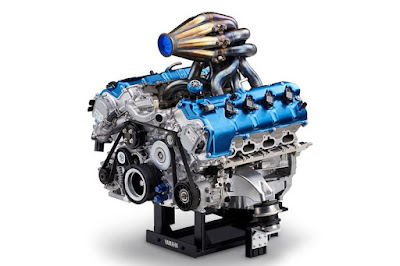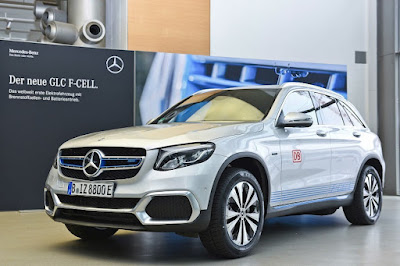 |
| Hypersion xp-1 Top speed - 220mph |
A hydrogen engine, also known as a hydrogen-fueled engine, is an internal combustion engine that uses hydrogen as its primary fuel source instead of conventional fossil fuels like gasoline or diesel. Hydrogen engines are designed to burn hydrogen in the presence of oxygen to produce mechanical energy, which can be used to power vehicles or other machinery.
The basic operation of a hydrogen engine is similar to that of a traditional internal combustion engine. The hydrogen fuel is injected into the engine's combustion chamber, where it mixes with air and is ignited by a spark plug or through compression. The combustion of hydrogen and oxygen produces a high-temperature, high-pressure gas that drives the engine's pistons, converting the chemical energy of hydrogen into mechanical energy. This mechanical energy can then be used to propel a vehicle or operate machinery.
Advantage of hydrogen engines is that they produce only water vapor as a byproduct of combustion, making them environmentally friendly and contributing to reduced greenhouse gas emissions. Additionally, hydrogen is a highly abundant element and can be produced from various sources, including renewable energy sources, further enhancing its appeal as a clean energy option.
However, there are some challenges associated with hydrogen engines. Hydrogen has a low energy density compared to conventional fuels, which means that a larger volume of hydrogen is required to produce the same amount of energy. Storage and transportation of hydrogen can be complex and costly, as it requires high-pressure containers or cryogenic conditions. Moreover, the production of hydrogen often relies on fossil fuel-based processes, which can limit the overall environmental benefits unless renewable energy sources are used.
4]There are different types of hydrogen engines or propulsion systems used in vehicles. Here are a few common types:
1)Hydrogen Fuel Cell Electric Vehicle
(FCEV):
Fuel cell vehicles use a hydrogen fuel cell to generate electricity through a chemical reaction between hydrogen and oxygen. The electricity powers an electric motor, propelling the vehicle. The only byproduct of this process is water vapor.
2)Hydrogen Internal Combustion Engine (ICE): In hydrogen ICE vehicles, hydrogen is used as a fuel in an internal combustion engine similar to gasoline or diesel engines. Hydrogen is injected into the engine's combustion chamber, where it mixes with air and is ignited to produce power. Hydrogen combustion in an ICE can be used in modified gasoline or diesel engines.
3)Hydrogen Hybrid: Hydrogen hybrid vehicles combine the use of hydrogen with another power source, such as a battery or conventional fuel. These vehicles typically have a smaller hydrogen fuel cell system that assists the main power source, providing additional power during acceleration or other high-demand situations.
4)Hydrogen Range Extender:
Some hybrid electric vehicles use a hydrogen fuel cell as a range extender. In this setup, an onboard fuel cell system generates electricity to charge the vehicle's batteries, extending the electric range and reducing reliance on the conventional internal combustion engine.
It's important to note that hydrogen fuel cell vehicles, such as FCEVs, are currently more common and commercially available compared to hydrogen internal combustion engine vehicles. The technology for hydrogen ICE vehicles is still being developed and has limited practical application at the moment.
5]Cars that are powered by hydrogen engine Hydrogen-powered cars, also known as fuel cell vehicles (FCVs), use hydrogen as their primary fuel source to generate electricity for powering an electric motor. Here are a few examples of cars that are powered by a hydrogen engine:
1)Toyota Mirai: The Toyota Mirai is a four-door sedan that runs on hydrogen fuel cells. It has a range of approximately 500 kilometers (310 miles) on a full tank of hydrogen.
Top speed- 178 km/h (110 mph).
2)Hyundai Nexo: The Hyundai Nexo is an SUV powered by a hydrogen fuel cell. It offers a range of around 600 kilometers (370 miles) and features advanced driver-assistance systems.
Top speed- 177 km/h (110 mph).
3)Honda Clarity Fuel Cell: The Honda Clarity Fuel Cell is a mid-size sedan that utilizes a hydrogen fuel cell system to generate electricity. It has a range of approximately 589 kilometers (366 miles).
Top speed- 160 km/h (100 mph).
4)Mercedes-Benz GLC F-CELL: The Mercedes-Benz GLC F-CELL is a plug-in hybrid SUV that combines a fuel cell system with a rechargeable battery. It offers an electric driving range of around 49 kilometers (30 miles) and a hydrogen range of about 430 kilometers (267 miles).
Top speed - 160 km/h (100 mph).
5)BMW i Hydrogen NEXT: BMW has developed the i Hydrogen NEXT prototype, which combines a hydrogen fuel cell system with an electric powertrain. Range of 504km
Top speed - 184 km/h (114.9 mph)
Hydrogen cars and electric vehicles (EVs) are both alternative options to traditional gasoline-powered vehicles, offering benefits in terms of environmental impact and energy efficiency. However, they operate on different principles and have distinct advantages and disadvantages.
1)Hydrogen Cars:
These vehicles use hydrogen gas as fuel, which is stored in high-pressure tanks and converted into electricity through a fuel cell. The only byproduct of this process is water vapor.
1)EVs:
Electric vehicles are powered by electricity stored in rechargeable batteries. The electricity can be obtained from various sources such as the electrical grid or renewable energy systems like solar panels.
2)Hydrogen Cars
Hydrogen is a clean and abundant resource, and when used in fuel cells, the only emission is water vapor. However, the production of hydrogen often relies on fossil fuels, which can generate greenhouse gas emissions unless renewable methods are used.
2)EVs:
Electric vehicles produce zero tailpipe emissions, which helps reduce air pollution and greenhouse gas emissions if the electricity comes from renewable sources. However, the environmental impact of EVs depends on the energy mix used for electricity generation.
3)Hydrogen Cars:
Hydrogen refueling infrastructure is still limited compared to traditional gas stations. Building a comprehensive hydrogen infrastructure requires significant investment in production, storage, and distribution facilities.
3)EVs:
EV charging infrastructure is more widespread and continues to grow, with public charging stations and home charging units becoming increasingly common. Charging an EV can be done at home, work, or public charging stations.
4)Hydrogen Cars:
Hydrogen vehicles typically offer longer driving ranges compared to most electric vehicles. Refueling a hydrogen car is similar to refueling a gasoline vehicle, taking just a few minutes.
4)EVs:
Electric vehicles generally have shorter ranges compared to hydrogen cars, although high-end models are catching up. However, recharging an EV's battery can take significantly longer than refueling a hydrogen car, even with fast-charging options.
5)Hydrogen Cars:
Hydrogen fuel cell vehicles tend to be more expensive to manufacture compared to EVs due to the complex fuel cell technology and limited production scale. Additionally, the cost of hydrogen production, storage, and distribution infrastructure is still high.
5)EVs:
Electric vehicles have seen a decline in prices over the years, and the cost of batteries, which are a significant component, continues to decrease. In some cases, EVs can be more affordable compared to hydrogen cars.
Upcoming blog
1)Hypersion xp-1
By-Tanishq Deshmukh
30 May 2023



















No comments:
Post a Comment